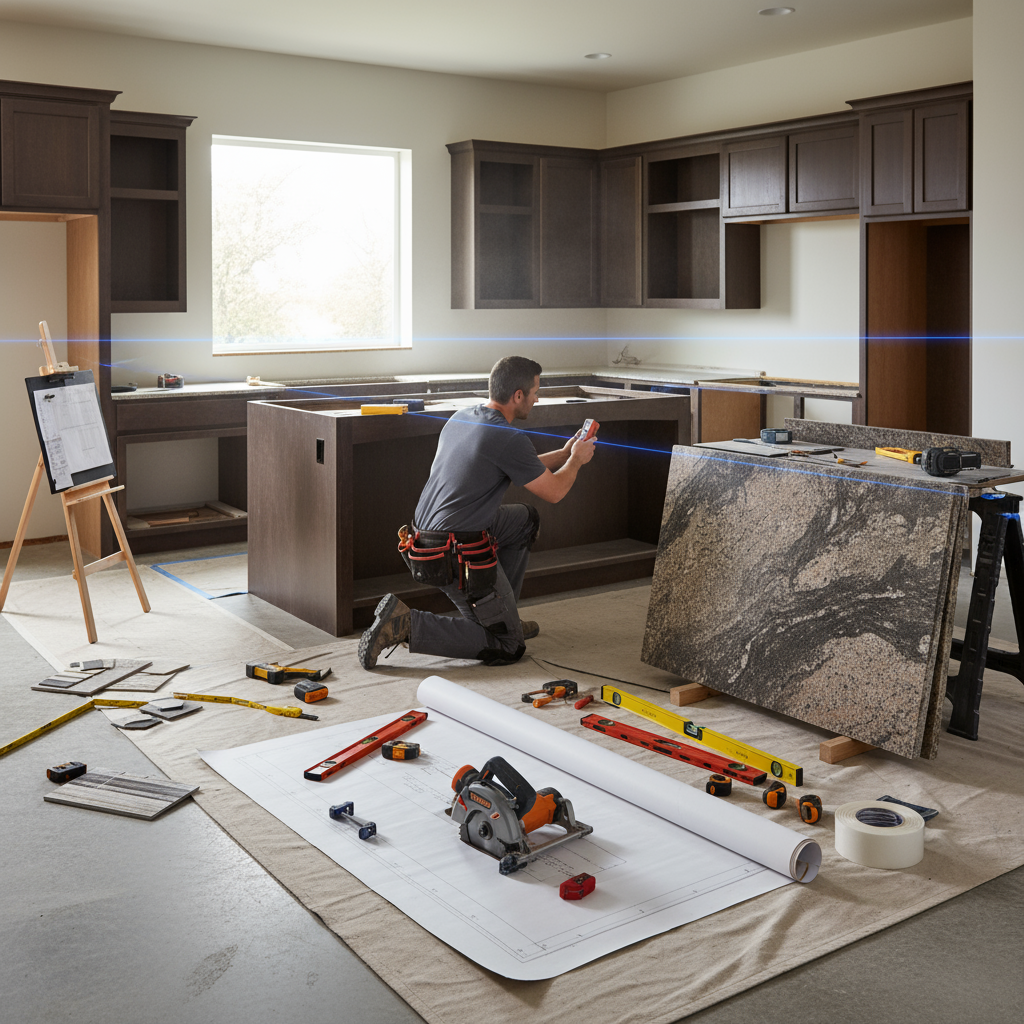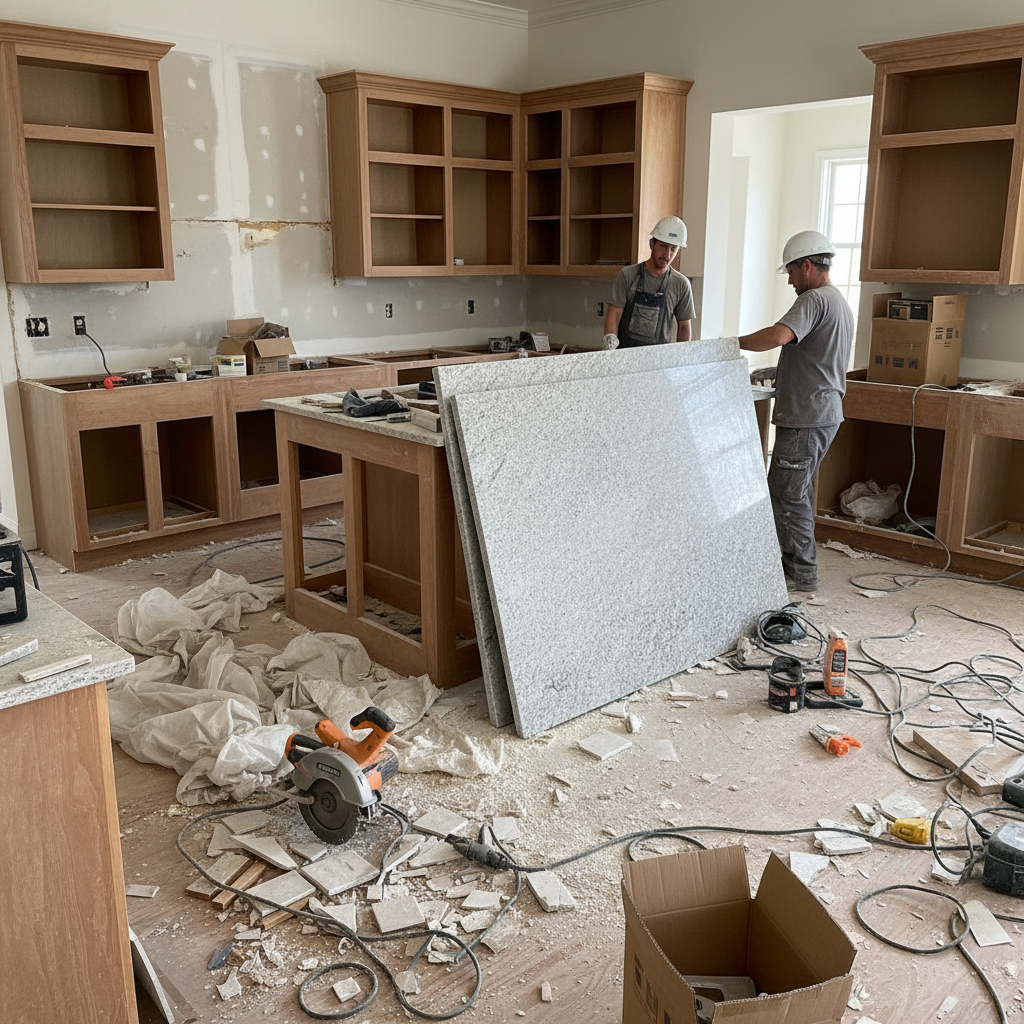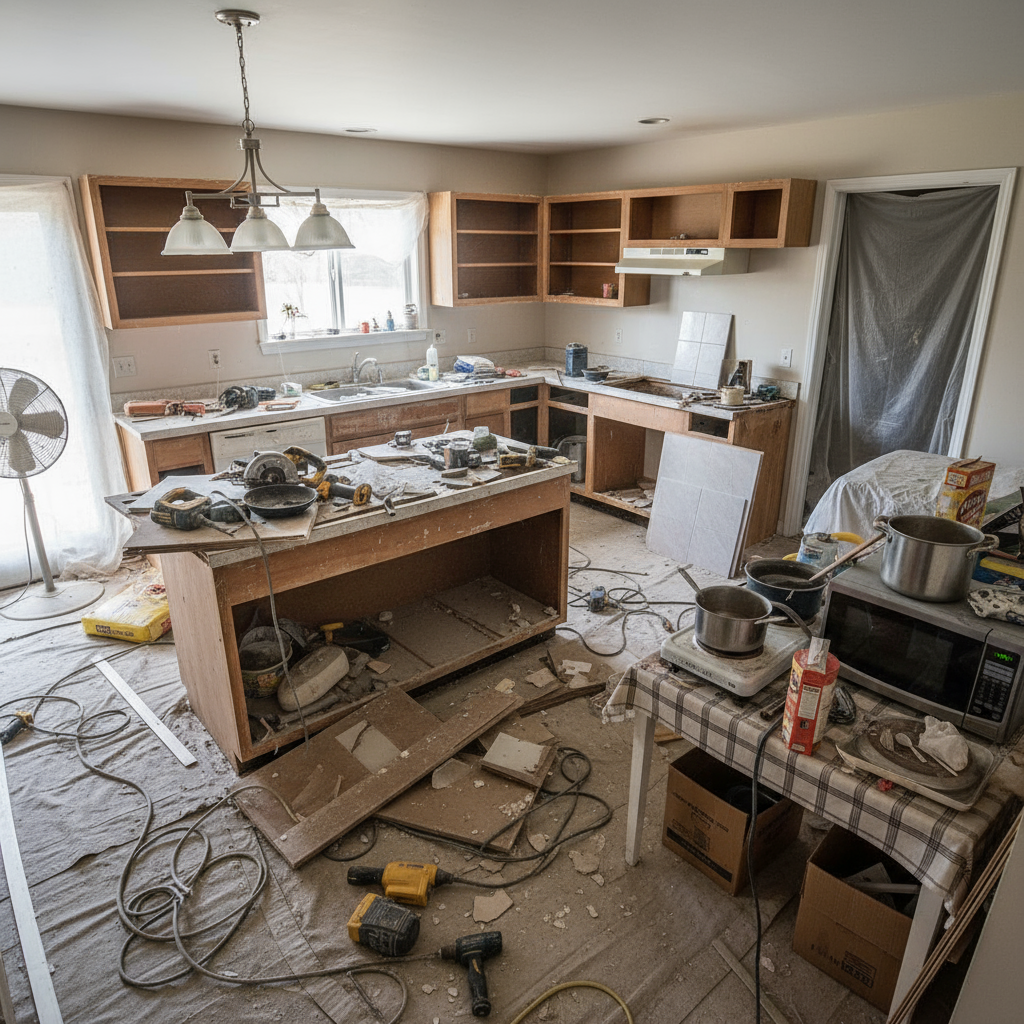TL;DR
- Always verify licensing and insurance before hiring
- Get multiple on-site quotes to understand true costs
- Check customer reviews and references thoroughly
- Prepare your site properly to avoid additional fees
Hiring a countertop installation service might seem like a breeze, but many homeowners end up making mistakes that lead to less-than-ideal results, unexpected costs, or even safety concerns. As a kitchen renovation pro, I’ve seen the fallout from hasty decisions and overlooked details. Knowing the common pitfalls can help you find the right pros and ensure your countertop installation goes off without a hitch.
These common slip-ups, from skipping crucial checks to not prepping the site properly, can leave you with unfinished jobs or damaged property. By sidestepping these mistakes, you’ll make sure your countertop installation project runs smoothly and adds real value. Let’s walk through the most frequent issues and how to dodge them.

Don’t Skip Checking Licenses and Insurance
One of the biggest blunders is hiring someone without verifying their credentials.
Unlicensed Operators
Working with unlicensed services is a gamble with quality and legality.
- Legal Headaches: You could face fines for breaking local rules.
- No Recourse: It’s tough to sort out disputes or shoddy work.
- Safety Risks: Untrained folks might cause accidents.
- Insurance Gaps: No coverage if property gets damaged or someone gets hurt.
Insurance Details Matter
Always double-check coverage before signing any contracts.
- Liability Coverage: Aim for at least $1 million to protect your property.
- Workers’ Comp: Absolutely essential if they have employees who get injured.
- Get Proof: Ask for a certificate directly from the insurance company.
- Know the Exclusions: Understand what the policy doesn’t cover.
Getting Quotes That Don’t Tell the Whole Story
Relying on quick phone estimates often leads to nasty surprises.
Just a Verbal Estimate? Big Mistake.
Phone quotes rarely capture the full picture of complexity.
- Site-Specifics Missed: Things like access or existing countertops aren’t assessed.
- Hidden Fees: Expect extra charges for tricky installations.
- Misunderstandings: Verbal agreements can easily lead to disputes.
- No Written Record: Makes it hard to compare or refer back to later.
Sticking to Just One Quote
Not shopping around means you might miss out on better value.
- Market Rates: Prices can differ a lot between providers and areas.
- Service Variations: Some include old counter removal, others charge extra.
- Quality Clues: Super low quotes might signal inexperienced installers.
- Bargaining Power: Having multiple quotes gives you leverage.
Ignoring What Other Customers Say
Failing to check reviews means you might hire unreliable services.

Not Checking Enough Platforms
Just looking at one review site doesn’t give you the full story.
- Broaden Your Search: Check Google, Yelp, BBB, and others.
- Recent Feedback: Focus on reviews from the last year or so.
- Look for Details: Pay attention to comments on cleanliness, punctuality, and communication.
- Spotting Patterns: Consistent complaints often point to bigger issues.
Red Flags for Fake Reviews
Be cautious of online feedback that seems too good to be true.
- All Perfect Scores: It’s rare for any business to have only 5-star reviews.
- Vague Comments: Generic praise often means the review isn’t genuine.
- Brand New Accounts: Reviewers who only have one review are suspicious.
- Suspiciously Similar Replies: If the company’s responses to all reviews sound identical.
Messy Site Preparation
Not getting the site ready properly can cause delays and unexpected fees.

Forgetting to Mark Utilities
Failing to locate underground lines before digging is risky.
- Call 811: It’s usually required by law at least 48 hours before work starts.
- Private Lines: Don’t forget to mark things like sprinkler systems or landscape lighting.
- Emergency Shutdowns: Delays can rack up hourly charges.
- Who Pays for Damage?: You might be liable if utility lines are hit.
Not Clearing the Area
Failing to clear the workspace properly makes the job harder.
- Remove Clutter: Get rid of rocks, toys, furniture, etc.
- Protect Cabinets: Cover or clearly mark existing cabinets.
- Clear Surfaces: Remove loose items to ensure a stable installation.
- Easy Access: Make sure there’s a clear path (10-15 feet) around the work zone.
Picking Based on Price Alone
The cheapest bid often ends up costing you more in the long run.
The Danger of Underbidding
Low quotes can be a sign of underlying problems.
- Rookie Installers: Expect slower work and potentially incomplete jobs.
- Old Gear: Might mean more time, a rougher finish, and higher risks.
- No Cleanup: You might be left with a mess that needs more work.
- No Guarantees: You have no recourse if the job isn’t done right.
Value Over Price
Think about the overall value, not just the initial cost.
- Total Cost: Factor in removal, disposal, and any potential repairs.
- Speed Matters: Pros usually finish much faster than amateurs.
- Quality Finish: A smooth installation saves on future maintenance.
- Peace of Mind: Insurance means you won’t be liable for accidents.
Not Asking the Crucial Questions
Failing to clarify details leads to misunderstandings and frustration.
What’s Included?
Make sure you understand exactly what the service covers.
- Installation Depth: Confirm they’ll ensure proper support and leveling.
- Handling Materials: How will they transport and install the countertops?
- Cleanup Details: What exactly do they clean up? Debris removal? Site leveling?
- Timeline: What’s a realistic timeframe for your specific project?
Experience Check
Verify the installer’s expertise.
- How Busy Are They?: How many jobs do they do weekly or monthly?
- Material Experience: Have they worked with granite, quartz, laminate, etc.?
- Training: Do their installers have certifications or safety training?
- References: Can they provide contacts for recent clients with similar projects?
Guarantees and Warranties
Make sure you’re protected after the job is done.
- Satisfaction Promise: What’s their policy if you’re not happy? Will they redo it?
- Warranty Length: What do they cover if cracks or settling issues pop up?
- Damage Claims: How do they handle claims if property is damaged?
- Payment Terms: What are the deposit and final payment requirements?
Ignoring Site Conditions
Not considering the environment where the installation will happen.
Kitchen Layout Challenges
Different layouts can make installation trickier.
- Tight Spots: Maneuvering large slabs requires extra care.
- Island Installs: Access can be difficult, increasing the chance of issues.
- Multi-Level Counters: Easier to access but need more precision.
- Wet Areas: Plumbing conflicts can cause delays or extra fees.
Weather Woes
The timing of the installation can impact feasibility.
- Humidity: High moisture can affect how adhesives cure.
- Temperature Extremes: Very cold or hot weather impacts material handling.
- Ventilation: Poor airflow can be an issue with dust and fumes.
- Seasonal Demand: Peak seasons might mean longer wait times.
Skipping Reference Checks
Not verifying the quality of their past work is a big risk.
Talk to References
Actually speak with previous customers.
- Recent Work: Ask about jobs done in the last 6-12 months.
- Similar Projects: Were they similar in size and material to yours?
- Communication: How responsive were they during the project?
- Overall Satisfaction: Were they happy with the final installation quality?
Professional Groups
Look for affiliations with industry organizations.
- NKBA: National Kitchen & Bath Association.
- CSI: Certified Stone Installer.
- BBB: Better Business Bureau accreditation.
- Local Boards: Check for regional professional groups.
Rushing the Hiring Process
Making quick decisions often leads to poor choices.
Emergency Situations
Urgent jobs require even more careful vetting.
- Damage Control: If there’s damage, get multiple quotes quickly.
- Safety First: Don’t skip verification, even in an emergency.
- Temporary Fixes: Consider temporary covers while you find the right installer.
- Insurance Claims: Document damage thoroughly before starting work.
Seasonal Rush
High demand during certain seasons can limit your options.
- Holiday Crunch: High demand means rushed hiring.
- Selling Your Home: Time constraints for staging.
- Event Deadlines: Don’t compromise safety for a party date.
- Give Yourself Time: Aim for 1-2 weeks for proper selection.
Not Reading the Contract Fine Print
Vague agreements are a recipe for disputes.

What the Contract Should Include
Make sure all the important details are written down.
- Scope of Work: Exactly what areas, materials, and cleanup are covered.
- Payment Plan: Deposit, progress payments, and final payment terms.
- Cancellation Clause: What happens if you need to back out?
- Dispute Process: How will disagreements be resolved?
Warranties and Guarantees
Protect your investment with clear terms.
- Installation Promise: What’s covered if cracks or gaps appear within a year?
- Damage Coverage: Specific procedures for handling property damage claims.
- Project Timeline: Expected start and end dates.
- Satisfaction Policy: What are the options for rework or refunds?
Conclusion
Avoiding common mistakes when hiring countertop installers is key to a successful project with professional results. As your go-to kitchen renovation resource, I always advise verifying credentials, getting detailed quotes, checking reviews, and prepping your site thoroughly. Taking the time to choose the right installer will help you avoid costly errors and achieve a beautiful, functional kitchen.
Use our directory to find vetted countertop installation pros with solid track records. With careful selection, your countertop installation will be efficient, safe, and stress-free.
